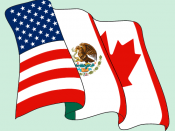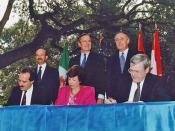Many of the pros of NAFTA were more in theory than in practice, though some do believe that is has improved the North American economies. Mexican President Vincente Fox said "It gave us jobs. It gave us knowledge, experience, technological transfer."Here are some of the major advantages which were used as arguments in NAFTA's defense.
Comparative Advantage: The idea that everyone benefits when countries produce and sell freely what they do most efficiently. In other words, everyone should specialize in what they do best and governments should intervene as little as possible in the process. This can cause also be a con as well, but I mention that later. In theory though it can help a smaller economy such as Mexico become more able to compete with larger economies such as the U.S.
Protectionism is expensive: Basically, tariff and non-tariff barriers result in higher prices for consumers. Barrier costs are passed on to consumers, or consumers are forced to buy more expensive goods.
Regional free trade agreements also help offset the danger of protectionism elsewhere and secure markets for exporters. In other words, they give leverage against other large economic entities, like the European Union.
Competition: Again, more competition is regarded as good for an economy as it should lead to cheaper prices and higher quality products.
Functionalism: The argument that cooperation in one area such as trade promotes cooperation in other areas. In theory, the drug problem, immigration problems, etc. are more forthrightly addressed because the countries each have more of a stake in one another's success.
Economic Growth: Because free trade promotes economic growth, pressing social problems, such as unemployment, environmental deterioration, or illegal immigration can be alleviated.
Trade between the NAFTA countries has tripled, from $297 billion in 1993 to $903 billion in 2007. And...


